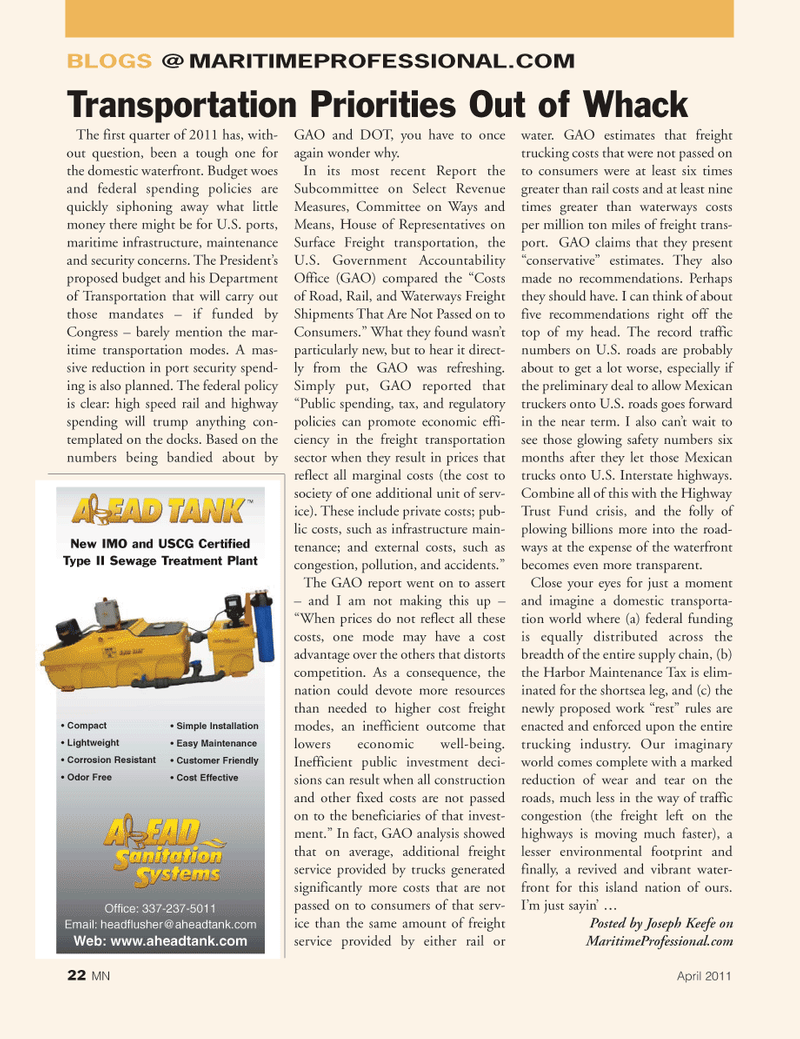
Page 22: of Marine News Magazine (April 2011)
Offshore Energy Edition
Read this page in Pdf, Flash or Html5 edition of April 2011 Marine News Magazine
22 MN April 2011
BLOGS @ MARITIMEPROFESSIONAL.COM
The first quarter of 2011 has, with- out question, been a tough one for the domestic waterfront. Budget woes and federal spending policies are quickly siphoning away what little money there might be for U.S. ports, maritime infrastructure, maintenance and security concerns. The President’s proposed budget and his Department of Transportation that will carry out those mandates – if funded by
Congress – barely mention the mar- itime transportation modes. A mas- sive reduction in port security spend- ing is also planned. The federal policy is clear: high speed rail and highway spending will trump anything con- templated on the docks. Based on the numbers being bandied about by
GAO and DOT, you have to once again wonder why.
In its most recent Report the
Subcommittee on Select Revenue
Measures, Committee on Ways and
Means, House of Representatives on
Surface Freight transportation, the
U.S. Government Accountability
Office (GAO) compared the “Costs of Road, Rail, and Waterways Freight
Shipments That Are Not Passed on to
Consumers.” What they found wasn’t particularly new, but to hear it direct- ly from the GAO was refreshing.
Simply put, GAO reported that “Public spending, tax, and regulatory policies can promote economic effi- ciency in the freight transportation sector when they result in prices that reflect all marginal costs (the cost to society of one additional unit of serv- ice). These include private costs; pub- lic costs, such as infrastructure main- tenance; and external costs, such as congestion, pollution, and accidents.”
The GAO report went on to assert – and I am not making this up – “When prices do not reflect all these costs, one mode may have a cost advantage over the others that distorts competition. As a consequence, the nation could devote more resources than needed to higher cost freight modes, an inefficient outcome that lowers economic well-being.
Inefficient public investment deci- sions can result when all construction and other fixed costs are not passed on to the beneficiaries of that invest- ment.” In fact, GAO analysis showed that on average, additional freight service provided by trucks generated significantly more costs that are not passed on to consumers of that serv- ice than the same amount of freight service provided by either rail or water. GAO estimates that freight trucking costs that were not passed on to consumers were at least six times greater than rail costs and at least nine times greater than waterways costs per million ton miles of freight trans- port. GAO claims that they present “conservative” estimates. They also made no recommendations. Perhaps they should have. I can think of about five recommendations right off the top of my head. The record traffic numbers on U.S. roads are probably about to get a lot worse, especially if the preliminary deal to allow Mexican truckers onto U.S. roads goes forward in the near term. I also can’t wait to see those glowing safety numbers six months after they let those Mexican trucks onto U.S. Interstate highways.
Combine all of this with the Highway
Trust Fund crisis, and the folly of plowing billions more into the road- ways at the expense of the waterfront becomes even more transparent.
Close your eyes for just a moment and imagine a domestic transporta- tion world where (a) federal funding is equally distributed across the breadth of the entire supply chain, (b) the Harbor Maintenance Tax is elim- inated for the shortsea leg, and (c) the newly proposed work “rest” rules are enacted and enforced upon the entire trucking industry. Our imaginary world comes complete with a marked reduction of wear and tear on the roads, much less in the way of traffic congestion (the freight left on the highways is moving much faster), a lesser environmental footprint and finally, a revived and vibrant water- front for this island nation of ours.
I’m just sayin’ ….
Posted by Joseph Keefe on
MaritimeProfessional.com
Office: 337-237-5011
Email: [email protected]
Web: www.aheadtank.com
New IMO and USCG Certified
Type II Sewage Treatment Plant • Compact • Lightweight • Corrosion Resistant • Odor Free • Simple Installation • Easy Maintenance • Customer Friendly • Cost Effective
Transportation Priorities Out of Whack

 21
21

 23
23
